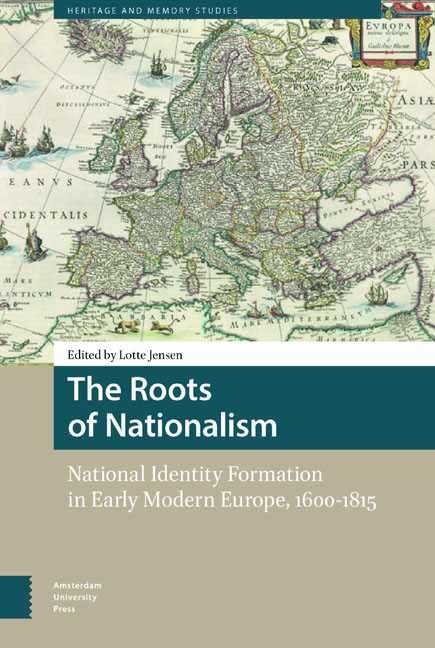Book contents
- Frontmatter
- Contents
- The Roots of Nationalism: Introduction
- Part One The Modernist Paradigm Contested
- Part Two The Genealogy of National Identity
- Part Three Negative Mirror Imaging
- Part Four Maps, Language and Canonisation
- Part Five Nation in the Age of Revolution
- List of Illustrations
- List of Contributors
- Index
15 - ‘Qu’allons-nous devenir?’: Belgian National Identity in the Age of Revolution
Published online by Cambridge University Press: 03 February 2021
- Frontmatter
- Contents
- The Roots of Nationalism: Introduction
- Part One The Modernist Paradigm Contested
- Part Two The Genealogy of National Identity
- Part Three Negative Mirror Imaging
- Part Four Maps, Language and Canonisation
- Part Five Nation in the Age of Revolution
- List of Illustrations
- List of Contributors
- Index
Summary
‘What have we been? What are we today?’ Charles Lambert d’Outrepont, lawyer for the Conseil de Brabant, asked his ‘concitoyens’ in a pamphlet he published in December 1789. Calling himself ‘un Belge’, he posed critical identity questions that cut right to the heart of how a nation identifies itself. In that year, revolution raged through the Southern Netherlands, a group of ten independent provinces that were part of the Habsburg Empire. The Treaty of Utrecht (1713) which had transferred the territories from Spanish to Austrian rule, stipulated that the provinces be considered as an inalienable unit. Yet they strongly identified as independent from each other; each province had its own administration and its own sovereign, even if that sovereign were the same person. As d’Outrepont wrote his pamphlet, nine of the ten provinces were securing their independence, successfully chasing Imperial troops and administrators from their borders with a patriot army. Indeed, just as he published the tract, members of the Estates-General were preparing to create a new federal state that would for the first time create an independent country composed of a political union of the provinces – to be called the United States of Belgium with a national Congress in Brussels. Charles d’Outrepont and his fellow Belges found themselves on the cusp of nation-building.
In the 1980s, social scientists declared nations the product of the nineteenth century, of modernity and mass-produced nationalisms as defined by the likes of Eric Hobsbawm, Ernest Gellner, Benedict Anderson and John Breuilly. Many historians have written numerous excellent rebuttals to this notion in the decades since then. They have helped strengthen the case for nationhood, or at the very least, national consciousness before the nineteenth century. In particular, David Bell has argued that a ‘cult of the nation’ predated the nineteenth century, a crucial counterpoint to the modernists’ paradigm. Importantly, though Bell's work focuses on the ‘idea of the nation [that] emerged with particular strength and clarity in eighteenth-century France’, he readily admits that ‘it did not emerge in France alone: the eighteenth century saw the development of sentiments and movements that deserve the name “nationalist” throughout Europe’.
- Type
- Chapter
- Information
- The Roots of NationalismNational Identity Formation in Early Modern Europe, 1600–1815, pp. 291 - 308Publisher: Amsterdam University PressPrint publication year: 2016



